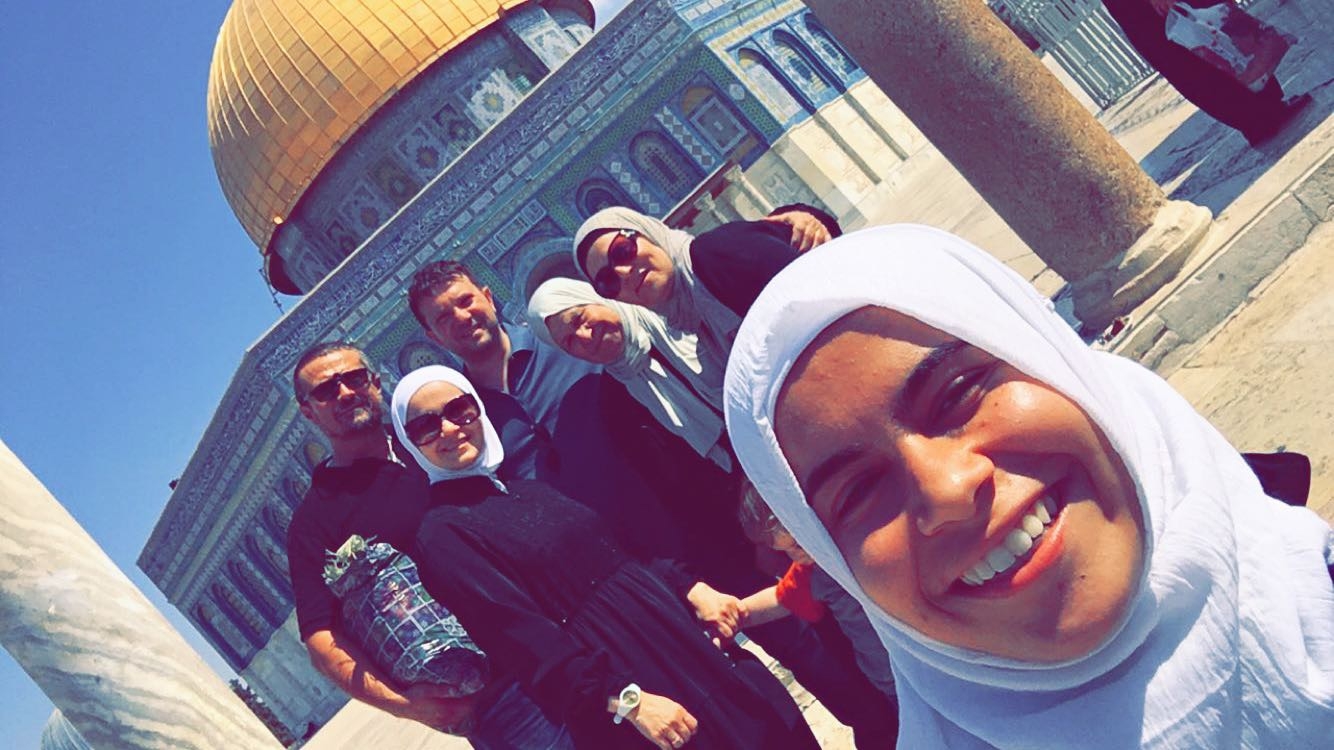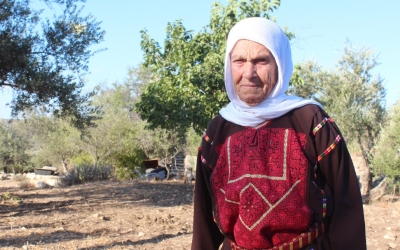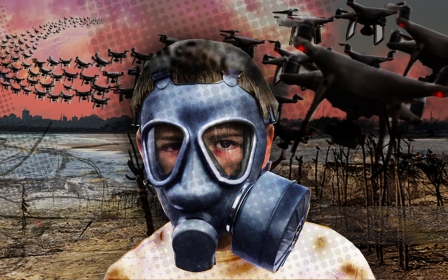Israel's banning of Tlaib is nothing new, say Palestinian-Americans

Palestinian-Americans across the United States had been looking forward to US Representative Rashida Tlaib's trip to the occupied West Bank since the congresswoman announced it last year.
Tlaib's Palestinian heritage made the idea of the trip that much sweeter to the community, but it also meant the news on Thursday that Israel would deny her entry for a political and familial visit into the occupied Palestinian territories came as no surprise to many.
The US State Department has a standing travel notice posted for US citizens of Arab or Muslim descent, warning that the Israeli authorities may deny them "entry or exit without explanation".
And that has happened to many Palestinian-Americans over the past few years, including Mariam El-Khatib.
The 23-year-old US citizen tried to visit her family in the East Jerusalem town of al-Eizariya in February, a few months after her father died. Khatib said she wanted to mourn him in the place where he was born and raised, and hoped to find comfort in being surrounded by hundreds of family members.
New MEE newsletter: Jerusalem Dispatch
Sign up to get the latest insights and analysis on Israel-Palestine, alongside Turkey Unpacked and other MEE newsletters
"Anyone familiar with Palestine knows how it is, we have these huge supportive families and I wanted to be there with them after my dad passed," she said.
But when she arrived at the Allenby Bridge border crossing, which is controlled by Israel and separates Jordan from the occupied West Bank, Khatib said she was stopped, interrogated for hours and turned around, with Israeli officials giving her a six-year ban on entering Israel and the occupied Palestinian territories.
Khatib lived in al-Eizariya with her immediate family for several years when she was in primary school. After moving back to the US, she and her family continued to visit Palestine every few years during summer vacations.
But when she started college at the University of Minnesota, Twin Cities, Khatib became involved in several student groups advocating for Palestine, landing her on a website that aims to discourage pro-Palestinian activism.
Known as Canary Mission, the website has compiled the biographies of thousands of students, professors and other activists who speak out against Israel's human rights record. The site lists full names, photos, links to personal social media accounts and screenshots from online posts.
Khatib said Israeli border officials used her profile on the Canary Mission website to come up with questions during her interrogation, adding that many of her friends who have also been denied entry said interrogators had pulled information from the website.
While she has a lawyer looking into her case, she is unsure if she should fight the ban.
"Fighting this in court drains resources - it takes so much money and time, and ultimately it's very likely that the whole legal fight would take five years anyway," Khatib said.
"It's a hard call because this is their tactic," she continued. "I already have friends who are scared to try and enter or are scared to post anything political on social media out of fear of getting banned - it's definitely a strategy."
Ban on BDS supporters
Israel passed a law in 2017 that allows officials to ban foreigners from entering the country or getting residency if they support the Boycott, Divestment and Sanctions (BDS) movement, which seeks to pressure Israel politically and economically to end its human rights abuses against Palestinians.
Representatives Tlaib and Ilhan Omar, the first two Muslim women elected to Congress, are also the first US legislators to openly support BDS.
Israeli Prime Minister Benjamin Netanyahu cited the anti-BDS law on Thursday to justify the ban on the two American legislators and their delegation.
US President Donald Trump called for the congresswomen to be denied entry, saying on Twitter that "it would show great weakness" if Israel allowed them in.
While the State Department acknowledges the unequal treatment of Arab-Americans in Israel, US officials do little to help those being held and interrogated at Israel's points of entry.
When Sandra Tamari was denied entry to Israel in 2012, she said the US embassy's response was the most shocking part of the situation.
"It was nighttime and the embassy called me back and the person on the phone said 'I understand you're being detained, are you Jewish?' That was the first question he asked me," she recalled.
"I said, 'No, I'm actually Palestinian-American.' And he said, 'Oh well then there's nothing we can do to help you' - and that was it."
Tamari told MEE she expects the situation will worsen for Palestinian-Americans trying to visit Israel and the occupied Palestinian territories - largely as a result of the alliance between Trump and Netanyahu and Israel's shift even further right, which is supported by both leaders.
"Trump's policies and support have emboldened Netanyahu and the Israeli right to think they can do whatever they want to Palestinians," she said.
"This alliance has made barefaced the racism that guides both leaders."
Tamari was denied entry at Israel's airport in Tel Aviv when she arrived with a delegation of community organisers hoping to observe the situation in Israel and Palestine.
She was questioned for eight hours about her activism and was the only person in the delegation to be denied entry, despite the fact that other Palestinian-American activists with similar backgrounds were in her group.
"It depends which guard you end up with in line. It's totally random, which is a way of making Palestinians wonder if they're going to get in or not. It heightens the fear for anyone thinking of going back so that maybe they won't try," Tamari told MEE.
"It's an intimidation tactic - it's certainly not about security," she said, pointing to the scores of times she was allowed to enter, going back to the 1990s when she was studying in Jordan on a Fulbright grant and visiting Palestine on the weekends.
Tamari said she doesn't know what kind of ban she is now subject to as a result of being denied entry at the airport. She has requested her file from Israel's Ministry of Interior, but she said so far she has not been given any more information.
'Elements of my life are missing'
Jonathan Brenneman, a Palestinian-American from the Kattab family in Palestine, has also been stonewalled while trying to obtain information about his ban.
Brenneman started working with the Christian Peacemakers Team (CPT), a non-violent observer organisation, in 2012.
After spending a year with the group in the occupied West Bank, he left the country briefly before trying to return in 2013. That's when Israeli authorities blocked him from returning as a result of his work with CPT, he said.
'I miss the fig trees there. I miss the grape vines; they don't taste the same here. There's all these elements of my life that are missing because I can't go back to that home'
- Jonathan Brenneman
He hired a lawyer, and after nearly a year of waiting outside the country, an Israeli court said that his denial had been a mistake.
He was told he would be allowed in the next time he attempted to enter, Brenneman said.
He tried to get back to Palestine again in the summer of 2014, going to one of the Israeli-run border crossings between the occupied West Bank and Jordan with a group of family members planning to attend a close cousin's wedding.
His family was held at the border for 10 hours. Everyone except for Brenneman was allowed in.
"There's been no update on the case for about three years now," he said.
Brenneman said he contacted his representatives and other US government agencies trying to get help, but he was always told that the US cannot interfere.
"My family that lives in Palestine continues to struggle and tries to live their lives, but I cannot be a part of that, outside of a few phone calls, I can't be there," he said. "It's really hard."
He said even the slightest thing can force him to relive the fact that he can't go back to Palestine.
"Right now I'm on vacation in Los Angeles. I saw a fig tree today and I nearly started crying because I miss the fig trees there, I miss the grape vines, they don't taste the same here," he said.
"There's all these elements of my life that are missing because I can't go back to that home."
This article is available in French on Middle East Eye French edition.
Middle East Eye delivers independent and unrivalled coverage and analysis of the Middle East, North Africa and beyond. To learn more about republishing this content and the associated fees, please fill out this form. More about MEE can be found here.





